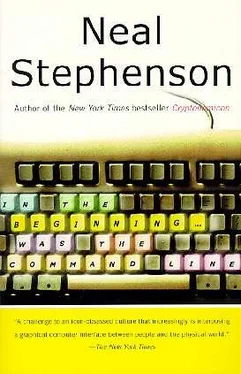Neal Stephenson - In the Beginning was the Command Line
Здесь есть возможность читать онлайн «Neal Stephenson - In the Beginning was the Command Line» весь текст электронной книги совершенно бесплатно (целиком полную версию без сокращений). В некоторых случаях можно слушать аудио, скачать через торрент в формате fb2 и присутствует краткое содержание. Жанр: Фантастика и фэнтези, на английском языке. Описание произведения, (предисловие) а так же отзывы посетителей доступны на портале библиотеки ЛибКат.
- Название:In the Beginning was the Command Line
- Автор:
- Жанр:
- Год:неизвестен
- ISBN:нет данных
- Рейтинг книги:5 / 5. Голосов: 1
-
Избранное:Добавить в избранное
- Отзывы:
-
Ваша оценка:
- 100
- 1
- 2
- 3
- 4
- 5
In the Beginning was the Command Line: краткое содержание, описание и аннотация
Предлагаем к чтению аннотацию, описание, краткое содержание или предисловие (зависит от того, что написал сам автор книги «In the Beginning was the Command Line»). Если вы не нашли необходимую информацию о книге — напишите в комментариях, мы постараемся отыскать её.
In the Beginning was the Command Line — читать онлайн бесплатно полную книгу (весь текст) целиком
Ниже представлен текст книги, разбитый по страницам. Система сохранения места последней прочитанной страницы, позволяет с удобством читать онлайн бесплатно книгу «In the Beginning was the Command Line», без необходимости каждый раз заново искать на чём Вы остановились. Поставьте закладку, и сможете в любой момент перейти на страницу, на которой закончили чтение.
Интервал:
Закладка:
Keep in mind that Apple's ability to monopolize its own hardware supply was once cited, by learned observers, as a great advantage over Microsoft. At the time, it seemed to place them in a much stronger position. In the end, it nearly killed them, and may kill them yet. The problem, for Apple, was that most of the world's computer users ended up owning cheaper hardware. But cheap hardware couldn't run MacOS, and so these people switched to Windows.
Replace "hardware" with "operating systems," and "Apple" with "Microsoft" and you can see the same thing about to happen all over again. Microsoft dominates the OS market, which makes them money and seems like a great idea for now. But cheaper and better OSes are available, and they are growingly popular in parts of the world that are not so saturated with computers as the US. Ten years from now, most of the world's computer users may end up owning these cheaper OSes. But these OSes do not, for the time being, run any Microsoft applications, and so these people will use something else.
To put it more directly: every time someone decides to use a non-Microsoft OS, Microsoft's OS division, obviously, loses a customer. But, as things stand now, Microsoft's applications division loses a customer too. This is not such a big deal as long as almost everyone uses Microsoft OSes. But as soon as Windows' market share begins to slip, the math starts to look pretty dismal for the people in Redmond.
This argument could be countered by saying that Microsoft could simply re-compile its applications to run under other OSes. But this strategy goes against most normal corporate instincts. Again the case of Apple is instructive. When things started to go south for Apple, they should have ported their OS to cheap PC hardware. But they didn't. Instead, they tried to make the most of their brilliant hardware, adding new features and expanding the product line. But this only had the effect of making their OS more dependent on these special hardware features, which made it worse for them in the end.
Likewise, when Microsoft's position in the OS world is threatened, their corporate instincts will tell them to pile more new features into their operating systems, and then re-jigger their software applications to exploit those special features. But this will only have the effect of making their applications dependent on an OS with declining market share, and make it worse for them in the end.
The operating system market is a death-trap, a tar-pit, a slough of despond. There are only two reasons to invest in Apple and Microsoft. (1) each of these companies is in what we would call a co-dependency relationship with their customers. The customers Want To Believe, and Apple and Microsoft know how to give them what they want. (2) each company works very hard to add new features to their OSes, which works to secure customer loyalty, at least for a little while.
Accordingly, most of the remainder of this essay will be about those two topics.
THE TECHNOSPHERE
Unix is the only OS remaining whose GUI (a vast suite of code called the X Windows System) is separate from the OS in the old sense of the phrase. This is to say that you can run Unix in pure command-line mode if you want to, with no windows, icons, mouses, etc. whatsoever, and it will still be Unix and capable of doing everything Unix is supposed to do. But the other OSes: MacOS, the Windows family, and BeOS, have their GUIs tangled up with the old-fashioned OS functions to the extent that they have to run in GUI mode, or else they are not really running. So it's no longer really possible to think of GUIs as being distinct from the OS; they're now an inextricable part of the OSes that they belong to--and they are by far the largest part, and by far the most expensive and difficult part to create.
There are only two ways to sell a product: price and features. When OSes are free, OS companies cannot compete on price, and so they compete on features. This means that they are always trying to outdo each other writing code that, until recently, was not considered to be part of an OS at all: stuff like GUIs. This explains a lot about how these companies behave.
It explains why Microsoft added a browser to their OS, for example. It is easy to get free browsers, just as to get free OSes. If browsers are free, and OSes are free, it would seem that there is no way to make money from browsers or OSes. But if you can integrate a browser into the OS and thereby imbue both of them with new features, you have a salable product.
Setting aside, for the moment, the fact that this makes government anti-trust lawyers really mad, this strategy makes sense. At least, it makes sense if you assume (as Microsoft's management appears to) that the OS has to be protected at all costs. The real question is whether every new technological trend that comes down the pike ought to be used as a crutch to maintain the OS's dominant position. Confronted with the Web phenomenon, Microsoft had to develop a really good web browser, and they did. But then they had a choice: they could have made that browser work on many different OSes, which would give Microsoft a strong position in the Internet world no matter what happened to their OS market share. Or they could make the browser one with the OS, gambling that this would make the OS look so modern and sexy that it would help to preserve their dominance in that market. The problem is that when Microsoft's OS position begins to erode (and since it is currently at something like ninety percent, it can't go anywhere but down) it will drag everything else down with it.
In your high school geology class you probably were taught that all life on earth exists in a paper-thin shell called the biosphere, which is trapped between thousands of miles of dead rock underfoot, and cold dead radioactive empty space above. Companies that sell OSes exist in a sort of technosphere. Underneath is technology that has already become free. Above is technology that has yet to be developed, or that is too crazy and speculative to be productized just yet. Like the Earth's biosphere, the technosphere is very thin compared to what is above and what is below.
But it moves a lot faster. In various parts of our world, it is possible to go and visit rich fossil beds where skeleton lies piled upon skeleton, recent ones on top and more ancient ones below. In theory they go all the way back to the first single-celled organisms. And if you use your imagination a bit, you can understand that, if you hang around long enough, you'll become fossilized there too, and in time some more advanced organism will become fossilized on top of you.
The fossil record--the La Brea Tar Pit--of software technology is the Internet. Anything that shows up there is free for the taking (possibly illegal, but free). Executives at companies like Microsoft must get used to the experience--unthinkable in other industries--of throwing millions of dollars into the development of new technologies, such as Web browsers, and then seeing the same or equivalent software show up on the Internet two years, or a year, or even just a few months, later.
By continuing to develop new technologies and add features onto their products they can keep one step ahead of the fossilization process, but on certain days they must feel like mammoths caught at La Brea, using all their energies to pull their feet, over and over again, out of the sucking hot tar that wants to cover and envelop them.
Survival in this biosphere demands sharp tusks and heavy, stomping feet at one end of the organization, and Microsoft famously has those. But trampling the other mammoths into the tar can only keep you alive for so long. The danger is that in their obsession with staying out of the fossil beds, these companies will forget about what lies above the biosphere: the realm of new technology. In other words, they must hang onto their primitive weapons and crude competitive instincts, but also evolve powerful brains. This appears to be what Microsoft is doing with its research division, which has been hiring smart people right and left (Here I should mention that although I know, and socialize with, several people in that company's research division, we never talk about business issues and I have little to no idea what the hell they are up to. I have learned much more about Microsoft by using the Linux operating system than I ever would have done by using Windows).
Читать дальшеИнтервал:
Закладка:
Похожие книги на «In the Beginning was the Command Line»
Представляем Вашему вниманию похожие книги на «In the Beginning was the Command Line» списком для выбора. Мы отобрали схожую по названию и смыслу литературу в надежде предоставить читателям больше вариантов отыскать новые, интересные, ещё непрочитанные произведения.
Обсуждение, отзывы о книге «In the Beginning was the Command Line» и просто собственные мнения читателей. Оставьте ваши комментарии, напишите, что Вы думаете о произведении, его смысле или главных героях. Укажите что конкретно понравилось, а что нет, и почему Вы так считаете.








